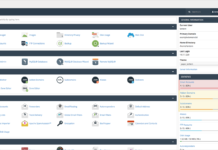Everything goes down to speed with servers and websites. Isn’t it? After all, it doesn’t matter how good-looking your website is if it takes forever to load. So, how can you improve your website speed and performance using the ispmanager Linux control panel?
In this article, we will show you 5 tools to optimize your website’s speed and performance in ispmanager Linux-based control panel and thus, improving user experience. You can also visit the ispmanager website for more information on the control panel.
5 Speed Optimizing Tools in ispmanager

The importance of a fast website cannot be overemphasized. For instance, optimizing the speed of your website allows you to retain the focus of your website users. Further, you will experience lower bounce rates, higher ranking in organic search, higher conversion rates, and better user experience if your website loads pages faster.
The ispmanager control panel is a smart tool to manage server and website administrator tasks, and it has all the flexible features and tools you need to enhance the speed of your website. Here are 5 tools you can find in the ispmanager control panel to administer website speed and performance.
1. Node.js
Node.js helps improve website speed in specific scenarios, especially for server-side rendering and real-time applications. Node.js allows for non-blocking I/O operations because the engine is based on an event-driven model, allowing code execution to continue even if other processes have not completed data transfer. As a result, the performance of certain types of web applications is improved, and programs run faster.
You must note that website speed is influenced by server hardware, network latency, and application architecture. Thus, simply using Node.js does not guarantee faster website speed but goes a long way in optimizing your website speed.
2. Percona Server
Percona Server is a free, open-source MySQL alternative designed to improve database performance and reliability. It is a drop-in replacement for MySQL that includes many additional and flexible features and optimizations. Using Percona Server can improve website speed in a few ways. Firstly, it includes improved query optimization and execution, which leads to faster database queries and improved overall website performance.
Secondly, it includes support for advanced features such as hot backups and advanced monitoring, which can help reduce downtime and improve reliability. Finally, Percona Server is a valuable tool for improving website speed and performance, particularly for websites that rely heavily on database queries and transactions.
3. PageSpeed for Apache and Nginx
PageSpeed is an open-source module developed by Google to improve website speed and performance, and it is available for both Apache and Nginx web servers. Perhaps you ask how PageSpeed works. It compresses images on a website, analyzes the code on the website, and optimizes it.
To install the module, enable the PageSpeed Module option when installing your web server. However, know that the ispmanager control panel installs separate versions of the module for Apache and Nginx. Further, for the webserver to use the module for website pages, enable the PageSpeed Module option in the website settings.
After installing and configuring PageSpeed, PageSpeed can help optimize your website by automatically compressing and minifying files, caching resources, and optimizing images. As a result, your website’s load times and overall performance is improved.
4. OpenLiteSpeed
OpenLiteSpeed is an open-source web server designed to be lightweight, high-performance, and easy to use in the ispmanager control panel. It is a drop-in replacement for Apache and is compatible with many popular Apache modules and configurations. Using OpenLiteSpeed can help improve website speed in several ways. Firstly, it is designed to handle a high volume of concurrent connections and requests, which can help improve website responsiveness and reduce load times.
Secondly, it includes advanced caching and optimization features that can help reduce server load and improve performance. For example, it includes a built-in page cache that can store static versions of pages to reduce server load and improve response times. Generally, OpenLiteSpeed is a valuable tool for improving website speed and performance, particularly for websites that rely heavily on static content and high traffic volumes.
An important nuance is that you cannot use both PageSpeed and OLS at the same time. Because OLS is a different web server
5. HTTP/2
HTTP/2 is a newer version of the HTTP protocol designed to improve website speed and performance. It includes several flexible features that can help reduce page load times and improve the overall user experience. Some key features of HTTP/2 in the ispmanager Linux-based control panel that can help improve website speed are highlighted below.
- Multiplexing: HTTP/2 allows multiple requests to be sent over a single connection to reduce latency and improve response times.
- Server Push: HTTP/2 includes a server push feature, which allows the server to send additional resources to the client before they are requested. This feature helps reduce page load times and improve overall website performance.
- Binary Protocol: HTTP/2 uses a binary protocol instead of the text-based protocol of HTTP/1, which helps reduce overhead and improve performance.
If your websites rely heavily on loading many resources, such as images, scripts, and stylesheets, then HTTP/2 is excellent for improving website speed and performance. Lastly, you can enable HTTP/2 for the entire server at once in ispmanager control panel.
Please note that without https (or ssl-certificate) http2 will not work correctly. If OLS is enabled, the protocol will automatically connect.

Wrap up
The speed at which your website loads significantly affects website performance and the experience of your website users. Thus, the need to optimize the speed of your website. That said, enhancing the speed and performance of your website can be challenging, but it is worth your investment.
With the ispmanager Linux control panel, optimizing the speed and performance of your website can be the easiest task. The tools discussed in this article are sufficient to help you maintain the performance and availability of your website. Ensure you maximize them.


















